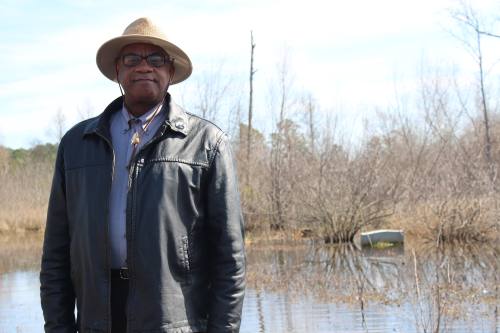Submerged beneath a foot of standing water, oil residue, overgrown shrubbery and buzzing with mosquitoes, Sweet Rest Cemetery is a nearly 150-year-old plot of land that serves as the final resting place for many of Tamina’s founders and some of the first settlers of Montgomery County.
In hopes of salvaging the land, members of the historic community of Tamina and the surrounding South Montgomery County area are working together to find a solution.
“We’re trying to get this corrected, collaboratively with all of South Montgomery County,” said Elijah Easley, founder of The Tamina Cemetery Project and Community Development Corporation. “I want all of us to roll up our sleeves, side-by-side, to get this taken care of. This is not a one-man show—this is about recognizing and remembering what these people gave to South Montgomery County.”
Preserving history
The 12-acre cemetery was established in the 1870s and contains roughly 250 grave sites of former slaves, Native Americans, law enforcement officers and military veterans.
Easley, who grew up in Tamina and has several family members buried in the grounds, said the cemetery has lain dormant for more than a decade. Easley said he believes the standing water, which was an issue long before Hurricane Harvey, may be due to blockages hindering the water flow.
The condition of the cemetery has rendered residents unable to bury family members with their ancestors for the past decade, Easley said.
“It’s hard to look at [the graves of] my grandfather who was a U.S. Veteran, and my uncle who was a former slave,” Easley said. “These are the people who are responsible for this land we have, and this is how we leave them? There’s a better way to do this.”
Easley said he founded The Tamina Cemetery Project and CDC with the sole purpose of bringing about change. The community held a town hall meeting about the project Feb. 2 and is working to conduct a propertywide study and to create a master plan in accordance with the Texas Historical Commission’s guidelines on preserving historic cemeteries.
Precinct 4 Commissioner Jim Clark said he has met with the nonprofit to discuss the project.
“Unfortunately, the area is a low-lying, flood-prone area with a lot of drainage issues,” Clark said. “[Tamina] has the full support and cooperation of my office and I’m on board with getting the proper plan in place to rectify this terrible situation. However, the county has no authority to arbitrarily go on private property and do this work—they have to go through the [THC’s] process.”
Upon survey completion, Easley said the nonprofit will work with the U.S. Army Corps of Engineers to extract water out of the cemetery and find long-term solutions.
“It’s so disrespectful for those that are buried there for [the cemetery] to be in such disrepair—and it’s not the community’s fault,” said Bob Bagley, a Montgomery County resident and Precinct 4 commissioner candidate. “It’s not the government’s job to always fix things, but I see this as a responsibility to help the community and preserve history. We can’t just turn our backs on people like this.”
Although a solution has yet to be identified, some options under consideration include raising the entire cemetery and redirecting the water to the San Jacinto River, Easley said.
A public sewer service, which the unincorporated community has fought for, for more than 15 years, could also be a solution, he said.
Easley said the success of the cemetery will rely heavily on donations, grants and fundraising.
“We don’t want [this effort] to be lopsided where others are doing everything for us,” he said. “If you do something to help yourself, others will come along and help.”
Tamina will host a cemetery rally June 16 to raise funds for the project.
“I pray this brings exposure so everyone can see the fight that we have in front of us,” Easley said. “I’m not going to stop until change occurs—then I can rest easy.”
For more information about The Tamina Cemetery Project and CDC, call 832-342-0404 or click here.











